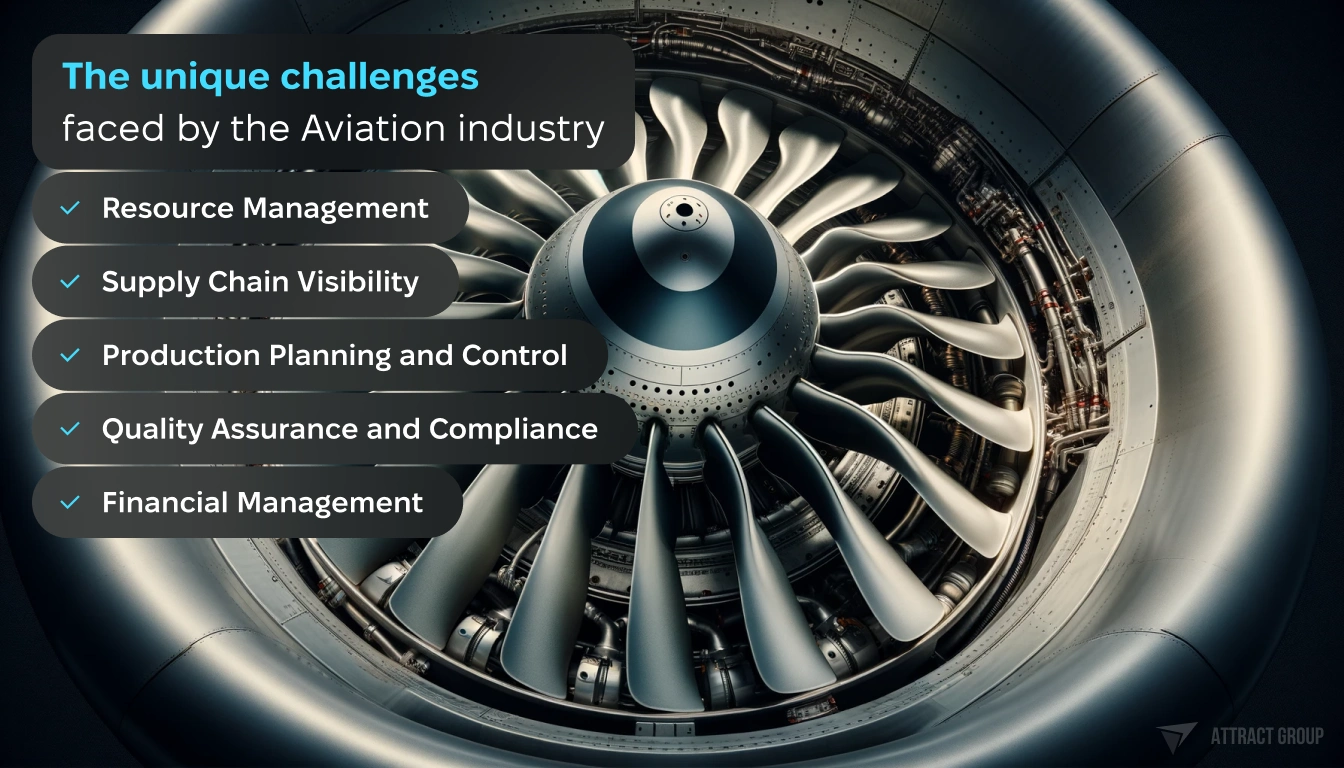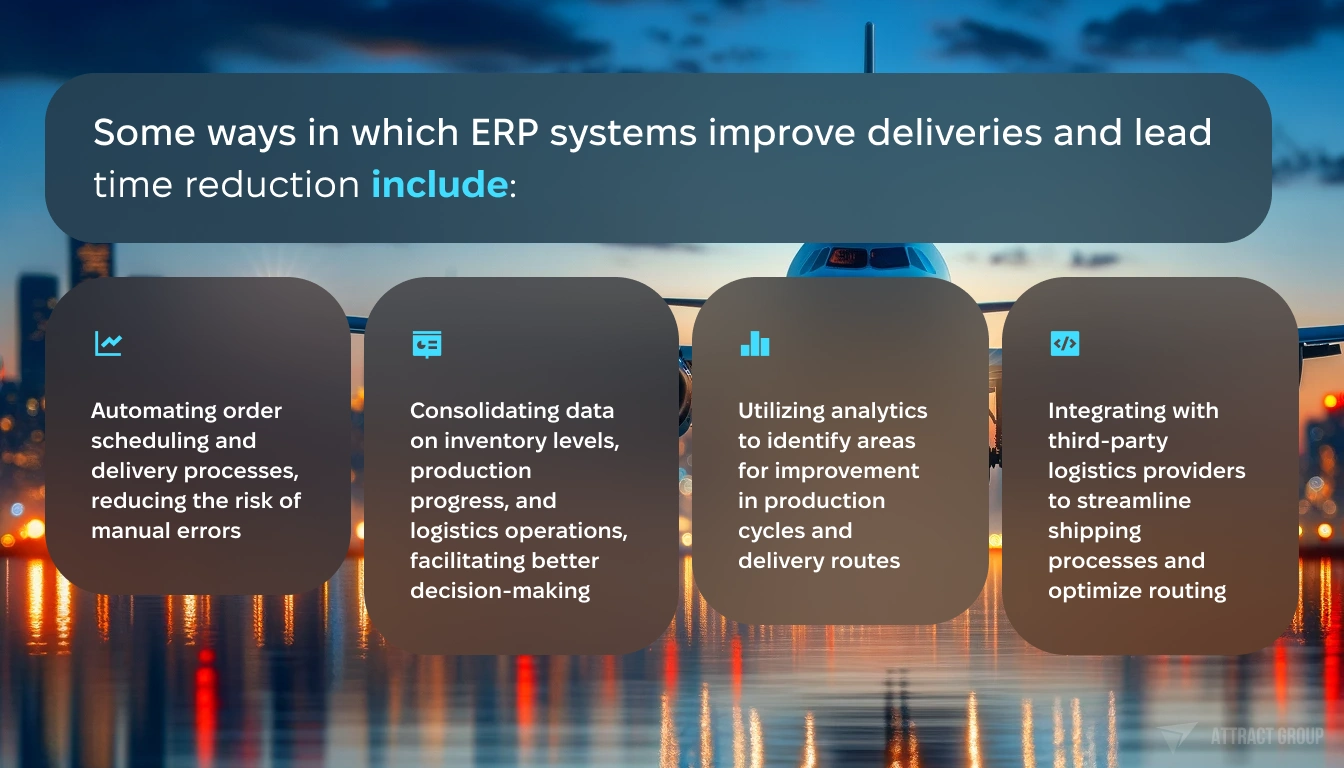Boost Efficiency with Airplane Custom ERP Solutions
 29 December 2023
29 December 2023? Listen to the Summary of this article in Audio
The mobile app ecosystem has exploded over the past decade. Businesses across every industry are recognizing the importance of having a robust mobile presence to better engage customers and drive growth in the digital age. According to a recent report, the world’s digital behaviors have evolved significantly, especially when compared to the pre-pandemic years. With a staggering 4.9 billion people using social media across the globe in 2023, as reported by Forbes, it’s evident that the digital realm is expanding at an unprecedented rate.
Modern aviation businesses operate with a high degree of complexity, making the implementation of Airplane Custom ERP Solutions crucial for enhancing operational efficiency. These bespoke systems provide a centralized repository for data across various business functions such as inventory, sales, international regulations, and security. Streamlined workflows, reduced inventory overhead, expedited sales processes, and compliance with stringent security measures are just some of the benefits offered by customized aviation ERP software tailored to the unique needs of the aircraft industry.
Key Takeaways
- Custom ERP solutions offer centralized data management for aviation businesses
- Efficient workflows, inventory management, and sales processes are key benefits
- Compliance with international regulations and security is facilitated by tailored software
- Customization ensures ERP systems cater to the specific needs of the aircraft industry
- The strategic investment in custom ERP software contributes to growth within the aviation sector
Understanding ERP in the Aviation Industry
ERP, or Enterprise Resource Planning, in the aviation industry refers to a comprehensive system designed to manage internal processes and streamline operations. With custom enterprise resource planning for aviation, businesses can control inventory, track supply chain activities, optimize sales, and monitor accounting, making it a central system of record for business data.
Custom ERP solutions are specifically invaluable for aircraft manufacturing management, as they reflect the unique requirements of the aviation industry and can significantly reduce operational inefficiencies.
Notably, an aviation ERP system is integral for organizing complex workflows, managing regulatory compliance, and overseeing production efficiencies. In this context, it is crucial to understand the key components of enterprise resource planning in aviation and how they address the unique challenges faced by the industry.
- Resource Management
- Supply Chain Visibility
- Production Planning and Control
- Quality Assurance and Compliance
- Financial Management

Developing custom ERP solutions for aviation allows businesses to access scalable software tailored specifically to their needs. By providing a modular approach to systems integration, these solutions can be customized to match the complexity and specific requirements of each organization. Some of the key benefits of such bespoke solutions include:
- Streamlined operational processes through automation
- Better inventory control and resource management
- Improved regulatory compliance and quality management
- Real-time data analysis for informed decision-making
- Enhanced collaboration among departments
| Standard ERP | Custom Aviation ERP |
|---|---|
| Generic functionality to cover a wide range of industries | Designed specifically for the unique challenges and requirements of the aviation industry |
| May require extensive customization, resulting in higher costs and longer implementation timelines | Can be implemented faster with less customization, saving time and resources |
| May struggle with industry-specific regulations and compliance | Comprehensive regulatory compliance and quality management features built-in |
Ultimately, implementing a custom enterprise resource planning solution for aviation can align business processes with strategic goals, while also enhancing overall efficiency and competitiveness in the aviation industry.
The Role of Custom ERP Solutions in Aircraft Manufacturing Management
Custom Enterprise Resource Planning (ERP) solutions have become increasingly essential in the aviation industry for their ability to optimize and streamline aircraft manufacturing management systems. These software applications offer numerous advantages over out-of-the-box solutions, mainly due to their tailored design, innate flexibility, and ability to meet the unique challenges faced by the aviation industry. In this section, we will explore the benefits of customization, how tailored workflows maximize efficiency, and the importance of meeting industry-specific standards.
An Overview of Customization Benefits
Custom ERP solutions offer a plethora of benefits which are integral to the aviation sector. As opposed to generic applications, these bespoke software options cater to the specific needs of aircraft manufacturing management. Some of the key benefits of custom ERP software include:
- Enhanced functionality tailored to address industry-specific requirements
- Improved integration with existing business processes and systems
- Scalability, allowing for seamless adaptability as the business grows
- Higher user adoption rates due to a more intuitive user interface
- Optimized allocation of resources, resulting in cost savings
Maximizing Efficiency with Tailored Workflows
Efficiency is critical in the dynamic and fast-paced environment of aircraft manufacturing. Custom ERP solutions enable the optimization of complex manufacturing workflows, making them adaptable to the unique processes of the industry. By integrating all relevant data into a centralized platform, custom ERP software:
- Streamlines end-to-end production processes
- Improves real-time decision-making through accurate data visibility
- Reduces turnaround times and minimizes errors
- Facilitates the seamless collaboration between departments
Meeting Unique Aviation Industry Standards
Aircraft manufacturing management operates under stringent regulations and high safety standards. Complying with these requirements necessitates comprehensive management solutions capable of handling the complexities of the aviation sector. Custom ERP solutions facilitate regulatory compliance by:
- Ensuring real-time tracking of projects and process adherence
- Streamlining the management of supplier and subcontractor processes
- Centralizing documentation and maintaining accurate records for audits
- Automating reporting for enhanced visibility and timely submission
A custom ERP solution is indispensable in the contemporary aviation landscape. By providing tailored solutions that cater to the specific requirements of the aircraft manufacturing management system, these software applications enable organizations to thrive in a competitive market. With streamlined workflows, improved efficiency, and a focus on meeting industry standards, the benefits of custom ERP software in aviation are undeniable.

Inventory Management: A Critical Component for Aviation ERP
Crucial to the aviation industry, inventory management within ERP systems offers detailed tracking and real-time snapshots of inventory health, greatly aiding decision-making. Aviation ERP solutions enable accurate monitoring of raw materials, work-in-process items, and finished goods stockpiles, reducing capital tied in excess inventory, mitigating long lead times, and preventing delayed deliveries. For Maintenance, Repair, and Overhaul (MRO) companies, ERP systems are especially vital as they provide the resilience needed to manage unforeseen repairs and the resulting strain on inventory and operations.
An effective inventory management for aviation ERP encompasses several key features that enhance the efficacy of aviation supply chain management. These features include:
- Automated tracking and real-time reporting of inventory levels and movements
- Integration with procurement and vendor management to optimize restocking strategies
- Visibility into inventory locations and supply chain links for enhanced traceability
- Accurate forecasting and demand planning to prevent stockouts or overstocking
Proactive inventory management is indispensable in the aviation industry, as it directly impacts aircraft availability, maintenance efficiency, and overall operating costs.
To further understand the significance of a robust aviation supply chain management system in the context of aircraft manufacturing and MRO services, the following table illustrates the potential benefits and outcomes:
| Benefits | Aircraft Manufacturing | MRO Services |
|---|---|---|
| Optimized Inventory Levels | Reduced capital investment in excess inventory and minimized stock obsolescence | Enhanced availability of critical components and materials for swift maintenance turnarounds |
| Improved Lead Times | Shortened delivery timelines, leading to increased customer satisfaction and higher order fulfillment rates | Faster execution of scheduled and unscheduled maintenance tasks, maximizing aircraft uptime |
| Streamlined Procurement | Synchronized acquisition of raw materials and components to match production schedules | Seamless collaboration with suppliers for expedited component sourcing and repair services |
| Enhanced Visibility | Real-time insight into multi-tiered supply chains, enabling informed decision-making and proactive risk management | Advanced tracking of component movements and efficient allocation of resources for maintenance tasks |
Inventory management is a critical component of aviation ERP, serving as the foundation for streamlined, cost-effective supply chain management. By leveraging advanced tracking, automation, and integration capabilities, aviation businesses can optimize inventory levels, improve lead times, and strengthen the overall performance of their manufacturing and maintenance operations.

Optimizing Aircraft Supply Chain with ERP Systems
Effective supply chain management is paramount in the aviation industry, and ERP solutions play a crucial role in optimizing procurement, logistics, and delivery processes. By utilizing ERP systems in the aircraft supply chain, businesses can streamline operations, reduce lead times, and ensure timely deliveries across the board.
Streamlining Procurement and Logistics
ERP systems designed for the aviation industry can integrate procurement and logistics processes for improved efficiency and cost reduction. With the ability to manage multiple suppliers and procurement channels, aviation ERP solutions providers offer enhanced visibility over the entire supply chain, enabling better decision-making and collaboration among stakeholders. A few of the benefits of implementing aviation ERP for procurement and logistics include:
- Improved supplier management through real-time data access and monitoring
- Streamlined purchasing processes, including order placement, tracking, and approvals
- Reduced errors due to automation and data validation features
- Better forecast accuracy, supporting more effective planning and budgeting
Ensuring Timely Deliveries and Reducing Lead Times
ERP for aircraft maintenance enables businesses to optimize their supply chain to ensure timely deliveries and reduce lead times. The sophisticated features and functionalities of aviation ERP solutions provider software facilitate precise tracking of shipments, visibility over transportation bottlenecks, and up-to-date reporting on contingency plans to mitigate risks of delays. Some ways in which ERP systems improve deliveries and lead time reduction include:
- Automating order scheduling and delivery processes, reducing the risk of manual errors
- Consolidating data on inventory levels, production progress, and logistics operations, facilitating better decision-making
- Utilizing analytics to identify areas for improvement in production cycles and delivery routes
- Integrating with third-party logistics providers to streamline shipping processes and optimize routing
ERP systems are increasingly important for optimizing procurement, logistics and delivery processes within the aviation industry, directly contributing to improved operational efficiency. By adopting ERP for aircraft maintenance and partnering with aviation ERP solutions providers, aviation businesses can achieve timely deliveries, reduced lead times, and enhanced overall performance in a highly competitive market.

Speak to our aviation software experts about tailored solutions for your business.
Integrating Sales and Customer Relations with Aviation ERP Solutions
An effective aerospace ERP software must seamlessly incorporate sales and customer relations functions to enable aviation businesses to manage customer interactions and maintain sales data. Sales integration into aviation ERP systems allows accurate quotations, streamlined order fulfillment, and improved customer satisfaction.
ERP software achieves this by leveraging real-time data to generate precise pricing and inventory availability information, resulting in faster and more reliable customer service. Additionally, integrating CRM features into aviation ERP solutions provides a comprehensive and customer-focused management system.
By incorporating CRM features, aviation ERP solutions provide a comprehensive management system that oversees customer interactions, maintains sales data, and supports customer-focused functionality.
The benefits of integrating customer relationship management in aviation ERP systems include:
- Centralized handling of customer inquiries and complaints
- Streamlined order processing and dispatch
- Improved customer communication and engagement
- Accurate forecasting for demand and sales planning
- Reduced sales cycle duration and costs
Key Metrics for CRM Integration in Aerospace ERP Software
Evaluating the effectiveness of a CRM-integrated aviation ERP system requires tracking key performance metrics that inform decision-making and yield insights into sales processes and customer interactions. The following table outlines some important metrics organizations should monitor:
| Metrics | Description |
|---|---|
| Customer Retention Rate | Measures the percentage of customers who re-engage with the business over a given period. |
| Average Order Value (AOV) | Calculates the average amount spent by customers per transaction. |
| Lead Conversion Rate | Reflects the proportion of potential customers who become paying customers. |
| First Response Time | Measures the time taken to respond to a customer’s inquiry or complaint. |
| Customer Satisfaction Score (CSAT) | Evaluates the overall satisfaction levels of customers with the service provided. |
By integrating sales and customer relationship management within aerospace ERP software, aviation businesses can maintain a holistic view of their customer interactions, streamline sales processes, and enhance overall customer experience, ultimately contributing to sustained profitability and growth.
Navigating Regulatory Compliance and Safety Standards in Aerospace ERP Software
In the aviation industry, navigating regulatory compliance and safety standards is a complex yet essential task. Aerospace ERP software factors in these requirements, streamlining processes and adding value to their operations. This section will cover the crucial aspects of handling complex regulatory requirements and maintaining high safety and quality controls within aerospace ERP solutions.

Handling Complex Regulatory Requirements
Aerospace ERP compliance involves managing a multitude of international and domestic regulations. These include safety standards, import/export laws, environmental policies, and other industry-specific guidelines. Failure to comply with these regulations can lead to severe penalties, fines, or damage to an organization’s reputation.
Aerospace ERP software plays a significant role in maintaining compliance by offering features such as:
- Centralized repository of regulatory requirements and updates
- Automated tracking of compliance activities and deadlines
- Document management and version control
- Integration with industry-specific software, e.g., flight management systems and maintenance systems
- Real-time reporting and analytics for enhanced decision-making
These features ensure that aviation businesses stay ahead of regulatory changes, reduce the risk of non-compliance, and boost overall efficiency.
Maintaining High Safety and Quality Controls
Quality controls in aviation software are integral to maintaining the safety of passengers, crew, and cargo. A well-designed aerospace ERP solution embeds stringent quality controls across various operational areas, including aircraft manufacturing, maintenance, and logistics. Some ways in which aviation ERP software contributes to safety and quality measures include:
- Real-time monitoring of manufacturing processes to identify discrepancies and defects
- Tracking of maintenance history and performance data for aircraft components
- Standardizing procedures and checklists to ensure consistent adherence to safety protocols
- Integration with external systems, like weather forecast and flight routing software, to make informed decisions regarding flight safety
- Enhanced communication and collaboration among different departments, leading to a proactive safety culture
In essence, aerospace ERP software provides a robust foundation to manage safety and quality controls, empowering aviation businesses to maintain high operational standards and cement their reputation in the industry.
Leverage our expertise in building compliant, customized software solutions.
The Strategic Edge: ERP for Enhanced Aircraft Maintenance Operations
Incorporating ERP software into aircraft maintenance operations provides aerospace organizations with an invaluable strategic advantage. By effectively coordinating maintenance activities, tracking progress, and ensuring resource availability, ERPs optimize workflows and support analytics-based decision-making. Consequently, the maintenance services in the aerospace sector are streamlined and aligned with regulatory compliance, enabling higher efficiency and lower operational costs.
Streamlined Aircraft Maintenance Management
Implementing ERP solutions for aircraft maintenance management facilitates an organized and structured approach to both routine and unscheduled maintenance, as well as overhauling operations. The software enables real-time monitoring and scheduling of MRO tasks, maximizing the effectiveness of maintenance teams by keeping them up-to-date with the most critical repairs, maintenance intervals, and equipment statuses.
ERPs bring transparency and efficiency to aircraft maintenance operations, consequently leading to reduced downtime, increased aircraft availability, and improved overall performance.
Moreover, ERP solutions mitigate supply chain disruptions, provide optimal inventory visibility, and reduce turnaround time, significantly contributing to cutting maintenance costs and improving resource utilization.
Data Analytics for Informed Decision Making
ERP systems enhance aircraft maintenance management through advanced data analytics capabilities. By gathering and analyzing extensive data streams from various sources, ERP platforms offer crucial insights that empower aerospace organizations to make informed decisions regarding maintenance operations.
- Identify and address equipment failure patterns
- Predict equipment life spans and forecast component replacements
- Optimize resource allocation for maintenance teams
- Perform cost-benefit analysis for maintenance operations
- Plan long-term maintenance strategies
Through data-driven decision-making, businesses can minimize maintenance-related disruptions, optimize resource allocation, and ensure efficient operations that adhere to regulatory compliance requirements.

Maintaining Compliance and Industry Standards
ERP solutions not only streamline operational workflows, but also ensure maintenance processes are in alignment with regulatory requirements and industry standards. Comprehensive ERP systems integrate compliance management features, such as:
- Documenting and tracking maintenance records
- Monitoring regulatory changes and implementing necessary updates
- Maintaining compliance checklists and generating reports
- Ensuring the safety and quality of maintenance work
- Conducting regular audits for a proactive approach to compliance
By integrating regulatory compliance management directly into aircraft maintenance operations, ERP systems help businesses maintain high operational standards while mitigating the risk of costly non-compliance penalties.
Custom ERP Solutions Facilitating Global Aerospace Scale
The aviation industry’s rapid growth in recent years has brought about numerous challenges for businesses operating on a global scale. Custom ERP solutions are specifically designed to address these complexities and facilitate seamless expansion, incorporating features that cater to international aerospace transactions and adherence to global standards and regulations.
Managing International Transactions and Currencies
As companies scale globally, managing international transactions becomes a critical aspect of their operations. Custom ERP solutions streamline this process by providing real-time currency conversion capabilities and seamless integration with various payment gateways, ensuring that transactions are efficiently carried out regardless of location or currency type.
- Real-time currency conversion: ERP software can automatically convert various currencies, reflecting up-to-date exchange rates, ensuring accurate invoicing, and financial tracking.
- Seamless payment gateway integration: Custom ERP solutions support multiple payment gateways, simplifying transactions and enabling businesses to serve customers across different nations with ease.
- Automated tax calculations: ERP systems can automatically compute and account for taxes based on location, keeping companies compliant with local laws and regulations.
Adhering to Global Standards and Regulations
Custom ERP solutions not only assist in managing finances but also ensure compliance with international standards and regulations. These systems provide timely updates on evolving requirements and facilitate the implementation of necessary changes to maintain compliance.
Custom ERP systems provide businesses with a powerful tool for navigating complex international regulations, reducing costly errors, and ensuring continued growth on a global scale.
| Global Standards and Regulations | How Custom ERP Solutions Help |
|---|---|
| Aerospace Quality Management Systems (AS9100) | Custom ERP solutions can manage quality control processes and workflows, helping companies align with AS9100 requirements and maintain certification. |
| International Traffic in Arms Regulations (ITAR) | ERP systems can monitor and control the transfer of sensitive aerospace information, ensuring compliance with ITAR guidelines. |
| European Union Aviation Safety Agency (EASA) Regulations | Custom ERP solutions can identify and enforce EASA regulations for aviation organizations operating within the European Union, ensuring continued compliance and reducing the risk of penalties. |
Global aerospace scaling with custom ERP solutions enables aviation businesses to overcome various challenges associated with international transactions, currencies, and regulatory compliance. By leveraging these tailored systems, companies in the aviation industry can efficiently and securely expand their operations on a global scale while maintaining adherence to required standards and regulations.
The Security Challenge: Protecting Data within Aviation ERP Systems
Data security in aviation ERP systems is of utmost importance, considering the sensitive nature of the information contained within them. This includes financial data, manufacturing blueprints, and employee details. Ensuring the implementation of strong security measures within ERP software is crucial for protecting against cyber threats. With a focus on modern best practices such as data encryption and access controls, aviation organizations can effectively safeguard their valuable data.
As companies configure their ERP systems, a careful balance must be struck between the need for remote access and the imperative of protecting against vulnerabilities and unauthorized intrusions. This balance can be achieved by adhering to some critical cybersecurity practices in aircraft ERP solutions.
- Implement robust access control: Limit access to sensitive data by implementing role-based access controls, ensuring that only authorized personnel can access specific information.
- Regularly update and patch software: Keep ERP systems up-to-date by applying patches and software updates as soon as they are released, helping to minimize potential security risks.
- Strong encryption: Use strong encryption techniques to protect data both at rest and in transit, making it more difficult for attackers to access sensitive information.
- Conduct regular security assessments: Perform periodic security audits to identify potential vulnerabilities and address them promptly.
- Employee training and awareness: Educate employees on cybersecurity best practices, making them a strong line of defense against potential attacks.
“Implementing strong security measures within ERP software is crucial for protecting against cyber threats.”
Cybersecurity in aircraft ERP solutions is an ongoing process that requires constant vigilance and a proactive approach to minimize threats. By prioritizing data security and employing best practices, aviation enterprises can protect their valuable data while maintaining the operational efficiency that ERP systems provide.
Get a free consultation from our experts on building a customized ERP solution tailored for your business needs.
Conclusion
In the ever-evolving aviation industry, custom ERP solutions have emerged as an essential component for success. These tailored systems help companies to better manage all aspects of their processes, enabling them to stay ahead of the competition. With customization comes a level of flexibility that allows for the efficient management of the unique challenges faced in aviation.
One of the most significant advantages of implementing custom ERP software in the aviation industry is the improvement in operational efficiency. From inventory management to customer relationship management, ERP systems streamline the necessary tasks while providing real-time data access and decision-making support. This, in turn, leads to cost savings and increased profitability.
Another beneficial aspect of embracing ERP solutions in the aviation sector is the ease in navigation of regulatory compliance and safety standards. Customized ERP systems are designed to adapt to the specific requirements and regulations in aviation, ensuring that all necessary standards are met without any complications. The result is a more resilient business, capable of thriving in the face of an ever-changing global landscape.
The implementation of custom ERP solutions for the aviation industry is a strategic investment that yields significant returns, both in terms of operational efficiency and overall growth. As companies in this sector continue to navigate the unique challenges presented by the industry, ERP software benefits in aviation will only become more apparent and invaluable in the years to come.
FAQ
What are Airplane Custom ERP Solutions?
Airplane Custom ERP Solutions are bespoke software systems designed to enhance operational efficiency in the aviation industry by providing a centralized repository for data across various business functions, such as inventory, sales, international regulations, and security.
How do Custom ERP Solutions benefit Aircraft Manufacturing Management?
Custom ERP Solutions benefit aircraft manufacturing management by reflecting the unique requirements of the aviation industry and significantly reducing operational inefficiencies, optimizing tailored workflows, and adhering to industry-specific standards.
How do Aviation ERP systems help with Inventory Management?
Aviation ERP systems enable accurate monitoring of raw materials, work-in-process items, and finished goods stockpiles. They provide real-time data on inventory health, helping businesses make better decisions and prevent issues like excess inventory, long lead times, and delayed deliveries.
How does ERP integration enhance Sales and Customer Relations?
ERP integration in sales and customer relations streamlines order fulfillment and prepares more accurate pricing and inventory availability quotes. By incorporating CRM features, aviation ERP solutions provide a comprehensive management system for customer interactions, sales data, and customer-focused functionality.
What is the role of ERP in Aircraft Maintenance Operations?
ERP software in aircraft maintenance operations offers a strategic advantage by coordinating maintenance activities, tracking progress, and ensuring resource availability. It helps streamline maintenance operations, aligns with regulatory compliance, and results in higher efficiency and reduced costs.
How do Custom ERP Solutions ensure Data Security?
Security measures within custom ERP solutions protect sensitive information from cyber threats by adopting modern best practices like data encryption and access controls. Companies must balance the need for remote access with the imperative of safeguarding against vulnerabilities and unauthorized intrusions.









